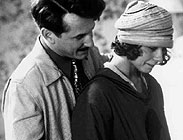|
|
|
|
Sweet
and Lowdown
|
 |
|
After the career nadir of Deconstructing Harry (1997) and Celebrity (1998) – only the most recent low-points in a terrifyingly uneven filmography – Woody Allen will gratify many of his ever-faithful fans with Sweet and Lowdown. It is a simple, cleanly styled, amusing and occasionally affecting piece – mixing an Allen obsession (jazz history) with an attractive, well-evoked period setting and a splendid performance by Sean Penn. Penn plays Emmet Ray, a virtuoso guitarist in the shadow of his hero, Django Reinhardt. Emmet's life and career – his reluctance about cutting records, his flakey professional ways, his odd habits, his womanising, his inability to express feelings – are patched together via accounts from present-day commentators including jazz critic Nat Hentoff. Of course, it is all a clever conceit involving a purely fictional character – perhaps assembled to remind us that, even before This is Spinal Tap (1984), Allen pioneered the mockumentary form in Zelig (1983). Jazz buffs will certainly enjoy Allen's allusions to many of the historic figures, lifestyles and legends associated with this music. But, as usual, Allen gears a more readily accessible level of the story to his general viewers: the fraught love life of Emmet, tracked through his relationships with the mute Hattie (Samantha Morton) and the socialite Blanche (Uma Thurman). For someone who has made so many films, Allen has learnt precious little about the art and craft of direction. Since Manhattan (1979), his films have mostly remained stagy and lifeless, dressed up with the same old trad-jazz tunes, cute gags and literary devices. His use of framing, camera movement, editing and sound design is often sloppy when it is not merely perfunctory. Allen has always been a better writer than he is a director (or actor, for that matter). Sweet and Lowdown reveals, with unusual clarity, both the charm and the limitations of his scriptwriting approach. Like another regularly overrated filmmaker, Mike Leigh, Allen has an infuriatingly static approach to characterisation. Each character is defined by a small number of tics and traits – like, for instance, Emmet's fainting spells – which they are made to repeat over and over, usually for the plain sake of an easy gag punchline. Allen likes to reserve a major change in a character's behaviour for the final scene – often to quite touching effect, as is the case here. (Fellini's La Strada [1954] is presumably Allen's model for such last-minute pathos.) But, for the rest of the movie, static characterisation requires undynamic plotting. Allen will often play with an unexpected narrative development – such as when Hattie gets an acting job in Hollywood – only to instantly defuse it a minute later. This is why Allen's films so closely resemble television situation comedies: nothing is allowed to alter the basic situation or premise for very long. Of course, Allen has a non-classical fondness for shaggy dog stories and rambling, episodic structures, often containing small, self-contained, embedded tales. As a writer, he is sometimes able to give these mosaic-plots a sturdy shape, as in Radio Days (1987). In Sweet and Lowdown, Allen indulges one of his favourite diversions: a legend about Emmet at the scene of a hold-up is told in three, successive, wildly different forms. But, for all its colourful detail, one is still left with a film that is largely running on the spot. Another crucial problem in Allen's work is how completely it centres itself on the perspective and attitudes of a central character – especially when (as in his last few films) that character is a male clearly in the mould of the neurotic Woody persona. It would be wrong to argue that Allen is uncritical of his heroes; the movement of his stories is almost always geared to arrive at the key instant when these men finally face (again in La Strada style) the general waste of their lives. Nonetheless, when it comes to observing and portraying the other, secondary characters – always less vividly realised than the central figure – Allen unfailingly adopts the hero's sarcastic, withering point-of-view. This is why the anonymous groups of people littered about his films – children, the elderly, supposedly simple folk – are always cruelly caricatured as oafish, vulgar, tastelessly kitschy and objectionable. The hero, even when he is a royal jerk to those who love him, must be maintained in a privileged, hallowed, elite position. Even worse, Allen is unable to show love relationships between men and women with any semblance of equality. Blanche in Sweet and Lowdown is a character stripped of dignity; we see her only as Emmet does, as a flighty, pretentious, fickle thrill-seeker. With Hattie, Allen aims for a more generous touch of sympathy or even pathos – and yet the key scene in which her and Emmet briefly reunite is among the flattest, the least imaginatively conceived and staged of any in the entire Allen oeuvre. Allen, as an artist, has a problem with empathy, and it has long stunted the evolution of his work. Whatever their last-moment humanist flourishes, his films only demand, ultimately, that audiences identify with him – his persona and his dry, ironic, sensibility – over all others in the story. And, to the degree that anyone can still find the anti-heroes of his films enjoyable in their solipsistic sense of God-given superiority, Allen's films are certainly enjoyable – in an empty, narcissistic, preening way. In this respect as in every other, Sweet and Lowdown is a model Woody Allen film – for better and for worse. MORE Allen: Bullets Over Broadway, Melinda and Melinda, Mighty Aphrodite, Small Time Crooks, Everyone Says I Love You © Adrian Martin July 2000 |
![]()